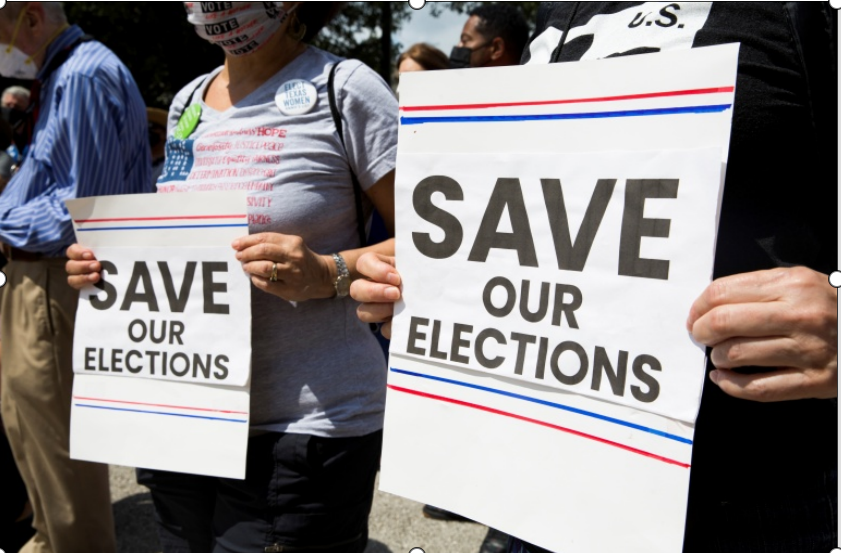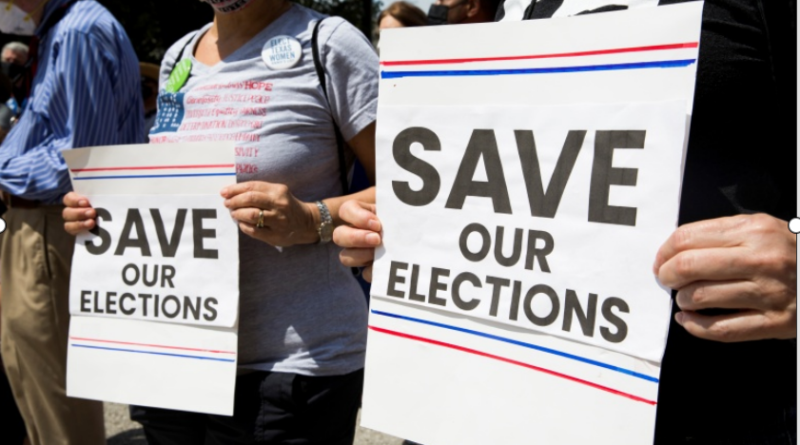Voting rights of minorities denied in parts of US: UN expert

UN special rapporteur says Texas voting restrictions dilute the rights of ethnic minorities, resulting in ‘gerrymandering’.
Published On 22 Nov 202122 Nov 2021
SOURCE: AL JAZEERA AND NEWS AGENCIES
The US for the first time was included on a list this week of ‘backsliding’ democracies, in part due to a slew of state legislation passed in recent months that make it harder for some voters to cast their ballots [File: Mikala Compton/Reuters]
A United Nations human rights expert has denounced measures in some parts of the United States, including Texas, that he said may undermine democracy by denying millions of people belonging to visible minority groups the equal right to vote.
Speaking on the final day of a two-week official visit to the US, Fernand de Varennes said on Monday that Texas legislation has resulted in “gerrymandering” and the dilution of voting rights of ethnic minorities in favor of white people.
“It is becoming unfortunately apparent that it is almost a tyranny of the majority where the minority right to vote is being denied in many areas, in parts of the country,” de Varennes, the UN special rapporteur on minority issues, said during a news conference.
De Varennes called for a “New Deal” to overhaul legislation. There was no immediate US reaction to his preliminary observations, which the UN expert said he had shared with US Department of State officials earlier in the day.
His comments came after the US was included for the first time on a list of “backsliding” democracies, in part due to a slew of state legislation passed in recent months that make it harder for some voters to cast their ballots.
Biden slams Republican state voting bills as ‘un-American’ The US Department of Justice sued Texas earlier this month “over certain restrictive voting procedures” contained in a contentious state law known as SB1, which the department said infringes on federal voting and civil rights laws.
“Research indicates that some states’ voter registration and voting laws, either recently approved or currently under discussion, end up disproportionately affecting minorities in a negative way,” the International Institute for Democracy and Electoral Assistance report found (PDF).
Americas Coverage Newsletter
Texas Governor Greg Abbott signed SB1 into law in September, arguing the Republican-backed measure would help combat voter fraud. But civil rights groups and other observers said the legislation aimed to make it harder for Democratic-leaning minorities to cast ballots.
Among other measures, SB1 prohibited drive-through and 24-hour voting locations, added new identification requirements for mail-in voting, restricted who could help voters that require assistance due to language barriers or disabilities, and empowers partisan poll-watchers.
Texas was one of more than a dozen US states to pass voting changes since the 2020 presidential elections, spurred in part by former President Donald Trump’s false claims that the vote was marred by widespread fraud.
The Brennan Center for Justice, a New York University research center that documents voting rights legislation in the US, reported that at least 19 states enacted 33 laws that make it harder for Americans to vote between January 1 and September 27 of this year.
One Person, One Vote | Democracy Maybe
Texas’s SB1 legislation “disproportionately burdens Latino, Black, and Asian voters and makes it harder for those who face language access barriers or who have disabilities to get help casting their ballots”, said the center, which has challenged the law in US court.
“In a state where it was already hard to vote, [SB1] compounds the barriers faced by Texas voters,” it said.
This month, lawsuits also were filed in Texas over congressional redistricting maps that critics said were “diluting the voting power of communities of color” while giving white voters political influence that outweighs their share of the state’s population.
The state was awarded two additional seats in the US House of Representatives this year due to population growth.
“Texas added two million Latinos to its population in the 2020 Census, and yet State Republicans have still found a way to gerrymander and avoid adding districts that represent this growth,” Maria Teresa Kumar, CEO of Voto Latino, a group that is challenging the maps, said in a statement late last month.
“The Texas GOP’s efforts silence Latino voices through diminishing the power of their voting, packing and dividing them into convoluted district lines that lessen their representation, and making it harder to elect representatives of their choice,” Kumar said.
Thousands march across the US to demand voting rights protection
Marches come amid state-level curbs to voting access that rights groups say disproportionately affect people of color.
Marches come amid state-level curbs to voting access that rights groups say disproportionately affect people of color.
Thousands of people are demonstrating in the United States capital and in several cities across the country to demand voting rights protection amid a barrage of state-level legislation that would impose ballot restrictions.
Held on the anniversary of Martin Luther King Jr’s historic 1963 March on Washington, organizers of the “March On For Voting Rights” rally say the efforts to curb voting access disproportionately affect people of color.
In Washington, DC protesters holding “Black Lives Matter” flags and signs calling for federal legislation marched from McPherson Square towards the final meeting point at the National Mall, where King gave his iconic “I Have a Dream” speech 58 years ago.
Other marches were planned in Phoenix, Miami, Atlanta, and dozens of other US cities.
“We will make history on Saturday” by picking up “the torch for justice my father and so many others carried”, said Martin Luther King III, the civil rights leader’s son, who was one of several speakers at the demonstration in Washington, DC.
“I just feel like we just kind of went backward,” Rikkea Harris, a 25-year-old student who traveled from Colorado with her father, Rickey Harris, to take part in the rally, told the AFP news agency.
Americans should “do their part in trying to knock down all these voting suppression laws that they’re putting in across the country”, added her father, 65.
The marches are being held on the anniversary of Martin Luther King Jr’s historic 1963 March on Washington [Evelyn Hockstein/Reuters]
‘Attempt to suppress’
US President Joe Biden has spoken out against the recent push in Republican-controlled states to pass legislation that would restrict voting access in July, calling it “an attempt to suppress and subvert the right to vote, and fair and free elections”.
Texas and Georgia are among several states to have put forward or passed such legislation in recent months, spurring widespread criticism.
The laws range from a requirement to have a fixed address to register to vote to a ban on the drive-through voting that was popular in some states last year amid the COVID-19 pandemic. But at the federal level, Biden has promised to defend voting access.
The Democrat-controlled US House of Representatives passed legislation on Tuesday that would restore sections of historic voting legislation that allowed legal challenges to state voting laws. The Voting Rights Act also required states with a history of voter discrimination to get federal preclearance before changing laws.
But Republicans in the Senate have promised to block voting rights legislation. Democrats do not have enough votes in that chamber of Congress to overcome a filibuster rule that requires some GOP support for passage.
Al Jazeera’s Rob Reynolds, reporting from the rally in Washington, DC, said Republicans in the Senate have said they would use the filibuster to defeat the John Lewis Voting Rights Advancement Act, which was passed in the House this week.
Reynolds said many demonstrators on Saturday said if the filibuster is used to block that bill – named after longtime US Congressman and civil rights icon John Lewis, who passed away last year – “then it’s time to do away with the filibuster, as well”.
A demonstrator shouts slogans at an anti-voter suppression laws march near the White House in Washington, DC, on August 28 [Tom Brenner/Reuters]
“I think this has given us a sense of urgency,” Reverend Al Sharpton told The Associated Press news agency earlier this week about the legislative fight.
“The Senate is now the battleground,” Sharpton said. “And clearly the timing of this couldn’t be better. Everything that we’re concerned about – whether it’s health care, whether it’s student loans, whether it’s educational equality, whether it’s economic relief – none of it can happen if our votes are lessened.”
The Brennan Center for Justice at New York University, which tracks voting rights curbs across the US, says between January 1 and July 14 this year, at least 18 states enacted 30 laws that restrict voting access.
“This wave of restrictions on voting – the most aggressive we have seen in more than a decade of tracking state voting laws – is in large part motivated by false and often racist allegations about voter fraud,” the think tank says on its website.
For months ahead of the last US presidential election, and for weeks after Biden won, ex-President Donald Trump made false claims that the vote was marred by widespread voter fraud. Those claims were picked up by many of Trump’s supporters, including some Republican legislators.
On their website, March On For Voting Rights organizers say restrictive state voting measures, including a ban on mail-in voting and drop boxes and reduced early voting days and hours, “suppress voting methods that enrich our democracy and lead to high turnout”.
“Racist, anti-democratic voter suppression laws amount to rigging the game. But in America, elections are not a game – and lives depend on their outcomes,” they say.
SOURCE: AL JAZEERA AND NEWS AGENCIES

